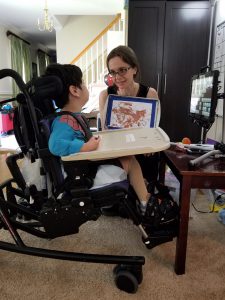 As this school year wraps up, it’s impossible to not think about what next school year will hold. Joey and my own daughter are both entering kindergarten, and I find myself often nervous about both of their transitions into big kid school.
As this school year wraps up, it’s impossible to not think about what next school year will hold. Joey and my own daughter are both entering kindergarten, and I find myself often nervous about both of their transitions into big kid school.
All parents feel big emotions as we get ready to send our children off to kindergarten for the first time. The bus seems so big, those school expectations feel so official, and our kids seem so small. I’m not sure anything compares to what a parent of a child with disabilities feels as they prepare for kindergarten.
You are being asked to put your trust in another adult, and can do nothing but pray that the adults in the school will see your child as you do. Will they honor the individual child in front of them? Will there be enough wait time between asking questions? Enough explanations of rules and routines? Enough nurture? Enough well balanced kindness and firmness? Will my child be set up to succeed, or to fail? Do these teachers believe my child can achieve and be a part of the class? Do they see my child as a burden, or as a joy?
I did not worry about this with my first child. Nervous, yes, but not the pit-of-my-stomach worry. With my second, I’ve been welcomed into the world of children with atypical development. For us, that development that leads my daughter to handle her emotions in non-age appropriate ways. I’m terrified for kindergarten in a way parents of typically developing children do not yet feel.
I know that with the right support my child can thrive. Without it? The kindergarten teacher holds my child’s future in her hands. Studies have shown that the relationships children have with their kindergarten teachers influences their attitudes towards school in middle school and beyond (Hamre & Pianta, 2001, Silver, et al, 2011). You can see why I am nervous. September will set the stage for my child’s educational career.
I am terrified, and my child can speak. She appears normal, and has good motor planning. She can sit in a circle, talk with friends, play pretend, and advocate for her needs. On a good day, she will not stand out to you as any different than the other kindergarteners.
If I’m terrified – what about the parents of Joey and kids like him? What about the children who have on-grade level academic skills, but don’t have an easy way to demonstrate those skills? Kids whose appearance leads to assumptions about their cognitive ability, and biases about where they should and should not be educated?
I am excited about kindergarten for Joey. He is going to have the opportunity to make friends, experience circle time, learn with others, and be a part of a broader community. Yet, I am also nervous. Will busy teachers take the time to get to know him? Will they give him the wait time he needs to select the right answer? Will they hold him to high expectations and believe that he can learn? Will they see his big personality beyond his physical needs? More importantly, will they facilitate opportunities for Joey to have conversations with peers, make friends, and be silly?
Joey has a strong team behind him, and I know that he is headed to school in a district with excellent teachers, schools, and systems for students like him. I know Joey’s team will set him up for success. I know this for my daughter as well, yet cognitively knowing something does not always change our emotions. So I’ll remind myself of what I know and work hard to set Joey up for success in kindergarten this summer.


